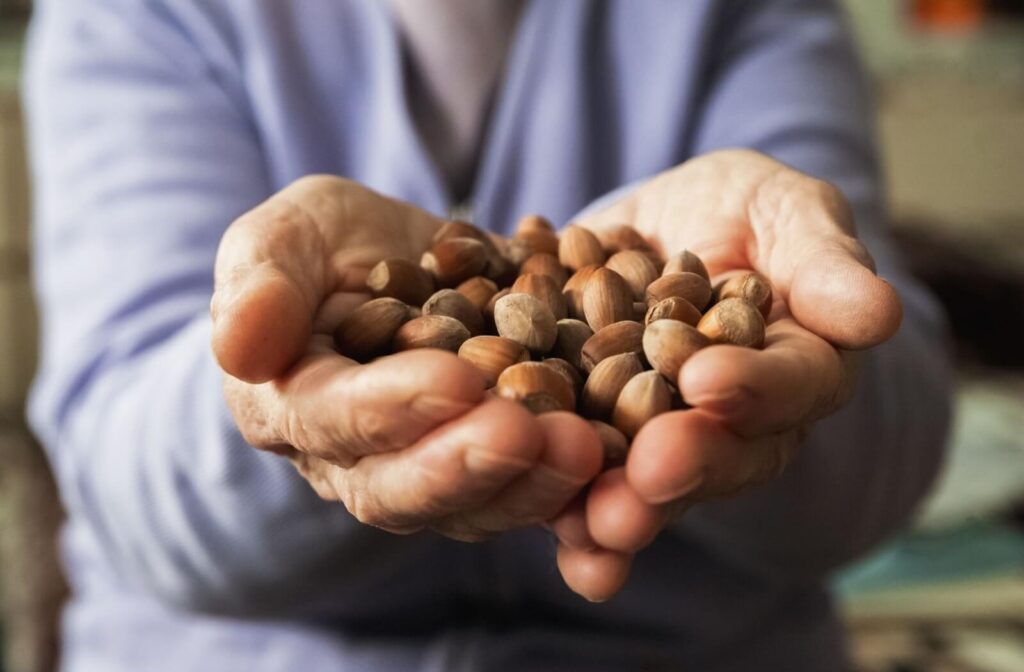Key Takeaways
- Nutrition is vital for healthy aging, supporting strength, energy, and overall well-being.
- A healthy diet contains a broad range of vitamins and minerals, fiber, and omega-3 fatty acids.
- Meals can be simple and enjoyable, with creative ways to add superfoods into breakfasts, lunches, dinners, and snacks.
- Community dining programs make healthy eating easier by combining nutrition with social connection.
As we grow older, the body’s nutritional needs evolve. While fewer calories may be required overall, the need for certain vitamins, minerals, and nutrients becomes greater. Eating well supports bone health, strengthens the immune system, protects cognitive function, and helps reduce the risk of chronic illness.
Good nutrition is one of the most powerful tools for aging well. It fuels energy, supports mobility, and provides the foundation for a vibrant and fulfilling lifestyle.
8 healthy foods to eat as you age include:
- Leafy greens
- Berries
- Fatty fish
- Whole grains
- Nuts and seeds
- Beans
- Yogurt
- Colorful vegetables
Beyond physical health, food also plays a role in emotional well-being. Sharing meals with others brings connection, joy, and a sense of belonging—all of which are just as important as the nutrients on the plate.
8 Healthy Foods for Seniors
1. Leafy Greens
Vegetables like spinach, kale, and Swiss chard are rich in calcium, folate, and vitamins A, C, and K. These essential nutrients are crucial for maintaining strong bones and a resilient immune system.
Leafy greens are also rich in fiber, which supports digestion and helps keep cholesterol levels in check. They’re easy to include in salads, soups, or smoothies, making them a versatile addition to daily meals.
2. Berries
Blueberries, raspberries, and strawberries are high in antioxidants, which protect memory, reduce inflammation, and support heart health. These natural compounds help shield the body from cell damage and may lower the risk of age-related cognitive decline.
Berries are also low in calories but high in flavor, making them a smart substitute for processed sweets. Adding them to breakfast, yogurt, or desserts keeps meals satisfying and health-focused.
3. Fatty Fish
Options such as salmon, sardines, and mackerel are rich in omega-3 fatty acids. These essential fats play a key role in lowering inflammation, protecting the heart, and supporting healthy brain function.
Studies suggest that regular fish consumption may help reduce the risk of dementia and support long-term cardiovascular wellness. Preparing fish in simple ways, like baking or grilling, ensures meals stay flavorful without added heaviness.
4. Whole Grains
Brown rice, quinoa, and oats contain fiber that can improve digestion and help keep energy levels steady throughout the day. Whole grains also support heart health by lowering cholesterol and reducing the risk of type 2 diabetes.
Unlike refined grains, which can spike blood sugar, whole grains provide slow-burning fuel that sustains energy. Adding them as a base to soups, bowls, or casseroles makes it easy to include them in meals regularly.
5. Nuts and Seeds
Walnuts, almonds, chia seeds, and flaxseeds provide protein, healthy fats, and vitamin E—key for supporting memory and heart function. Their natural crunch makes them a satisfying snack, while their nutrient profile supports healthy cholesterol levels and brain health.
A handful of nuts can keep energy steady between meals, while seeds can be sprinkled into yogurt, smoothies, or baked goods. Consistent small servings bring big long-term health benefits.
6. Beans and Legumes
Chickpeas, lentils, and black beans are budget-friendly and versatile, making them staples in healthy diets. They’re packed with protein and fiber, which help regulate blood sugar, promote satiety, and support digestive health.
Beans are also a great source of plant-based iron, which is essential for maintaining energy and preventing fatigue. Whether added to soups, salads, or served as hearty sides, they’re a delicious way to stay nourished.
7. Yogurt
This calcium-rich food strengthens bones and offers probiotics that support gut health. Probiotics are beneficial bacteria that can improve digestion and may help boost immunity.
Yogurt also provides protein, which supports muscle maintenance as the body ages. Choosing plain varieties allows for customization with fruit or nuts, avoiding excess sugar while still keeping meals flavorful.
8. Colorful Vegetables
Carrots, bell peppers, squash, and beets contain a wide variety of vitamins and antioxidants. Their vibrant colors indicate different nutrient benefits—for example, orange vegetables provide beta-carotene for eye health, while red ones may support heart function.
Eating a rainbow of vegetables ensures seniors receive a diverse mix of nutrients. Roasting, steaming, or enjoying them in soups can make these veggies both tasty and easy to digest.

How to Incorporate These Foods Into Daily Meals
Healthy eating doesn’t require complicated recipes. Small, consistent choices can make a big difference in overall health and energy.
- Breakfast: Yogurt topped with berries and chia seeds, or oatmeal sprinkled with walnuts.
- Lunch: A salad made with leafy greens, beans, and colorful vegetables for a nutrient-packed boost.
- Dinner: Grilled salmon paired with quinoa and roasted carrots for a balanced, heart-healthy plate.
- Snacks: Hummus with veggie sticks, chia pudding, or a handful of almonds for steady energy between meals.
For many older adults, the joy of eating goes beyond nutrients. Dining programs in senior living communities often blend healthy recipes with familiar comfort foods, making it easier to enjoy balanced meals in a warm, social environment. Meals are designed with variety, flavor, and nutrition in mind, so residents can truly look forward to every bite.
Nourishing Seniors with the Power of Food and Community
Food is more than fuel—it’s the foundation for healthy aging. The right foods can help seniors maintain strength, protect memory, support the immune system, and reduce the risk of chronic illnesses. Just as importantly, meals bring comfort, joy, and opportunities for connection, which play a big role in overall well-being.
At All American Assisted Living at Wareham, we believe healthy eating should be enjoyable, social, and full of variety. Our dining program incorporates fresh, seasonal ingredients and thoughtful recipes to support residents’ health while creating moments of joy around the table.
Schedule a visit today to discover how our community dining experience helps residents embrace healthy aging, one delicious meal at a time.



